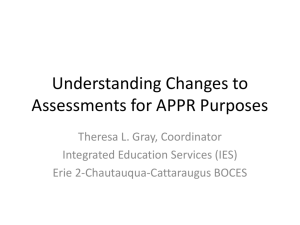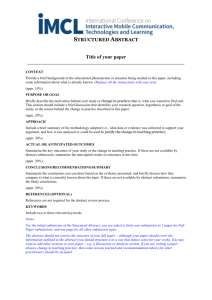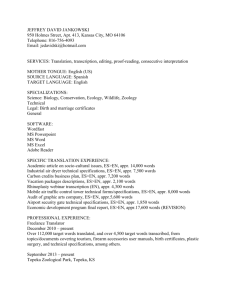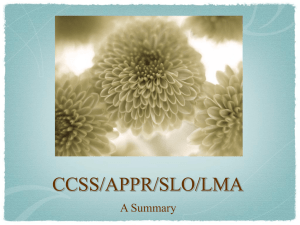APPR System
advertisement
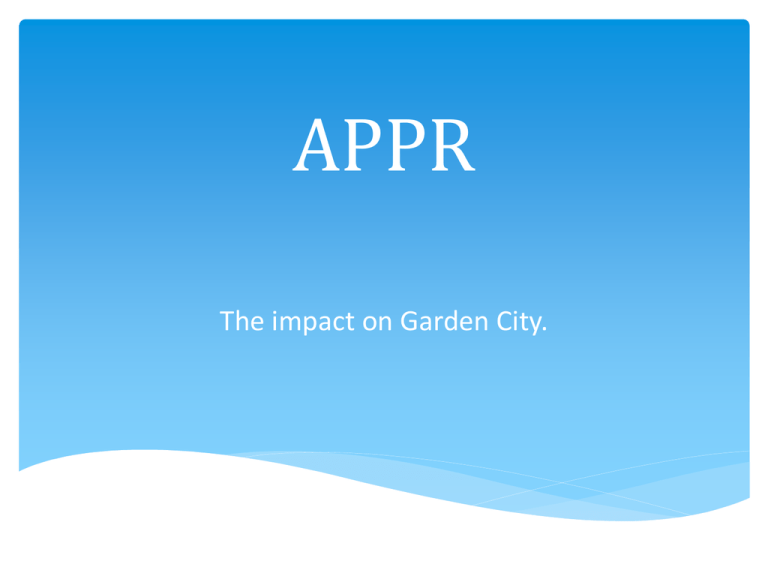
APPR The impact on Garden City. What is APPR? Annual Professional Performance Review New York State Educational Law § 3012-c Established in 2010 Implemented 2012-2013 History Evolved from New York State’s application for the federal Race to the Top (RTTT) competition. Districts and Unions were asked to “sign on” to the application from NYS – we did. NYS was awarded approximately $700 million to “reform” education by: Implementing CCSS (required) Longitudinal Data System Increasing Charter Schools APPR System How were those funds allocated? $348.3 million to “build the capacity of educators statewide and directly support new curriculum models, standards, assessments, teacher and principal preparation and professional development, and the statewide student data system.” The remaining funds to be spread out among school districts and charter schools (increased from 200 to 460). NYC Chancellor’s Office received $258,065,077 Garden City received $0 Back to APPR… Evaluates Teachers and Principals Receive a score on a 100 point scale Receive a rating Highly Effective (91-100) Effective (75-90) Developing (65-74) Ineffective (0-64) 20% - State Growth Score 20% - Locally Determined 60% - Other Measures of Effectiveness APPR Breakdown 20% - State Growth Score – IMPACTS STUDENTS Teachers in Grades 4-8 receive a score from the state based on student growth from the previous year Grade 3 ELA and Math state assessments are used as baseline data Subjects with a state assessment (Regents Exam) must use that assessment as the evidence when determining if the target was met APPR Breakdown 20% - Locally Determined – IMPACTS STUDENTS Student Learning Objectives (SLOs) Requires baseline data: Could be two tests – one in September and one in the Spring, or data from the previous year can be used IF it is related. *You wouldn’t use data from Earth Science to set a target in Biology 3rd Party State Approved Assessments Acuity (McGraw Hill) was used 2012-2013 Grades 3-8 Acuity cost GCUFSD $80,000! We (district and GCTA jointly) looked at other approved assessments APPR Breakdown 60% - Other Measures of Effectiveness Requires at least two observations (as dictated by law) with at least one being unannounced We use the Danielson Rubric (GC adopted this rubric in 2007 – long before any NYSED guidance required the use of a rubric) The Evaluation Process A teacher is observed and receives feedback from their administrator during the school year. Teachers also have the opportunity to provide their administrator with additional evidence of effective teaching as defined in the Danielson rubric. The four domains of the Danielson rubric are: 1. 2. 3. 4. Planning and Preparation Classroom Environment Instruction Professional Responsibilities The evidence collected by the administrator and provided by the teacher are used to evaluate the teacher with the rubric. The evaluation is scored from 1-4, then converted to a score on a 60 point scale Evaluation Process continued… Teachers administer SLOs, which require a target to be set after determining a baseline (previous data or fall assessment) Overall Growth Target Overall Achievement Target Individual Targets based on individual students A spring assessment is used to determine if the student “met the target” On average, we use a table that links 75% of students meeting the target to 15 out of 20 points for the local portion of the evaluation. Evaluation Process continued… In grades 4-8, the state assigns a growth score out of 20 points to teachers based on the previous year’s data This year’s growth scores were calculated using two completely different sets of standards and assessments Commissioner King has said the 2013 scores are a new baseline and shouldn’t be compared to the past, yet that’s exactly what he did for teachers All other grades require a SLO, which must use any applicable state assessment as a factor From King’s letter to parents dated August 7, 2013 “Proficiency rates –the percentage of students meeting or exceeding the standards –on the new Common Core assessments cannot be compared with last year’s proficiency results since the old scores are from an old test based on the former standards. This is a new beginning and starting point that will provide better, clearer information to parents, teachers, and principals about what our children know and are able to do.” Evaluation Process continued… Each sub-component score is calculated and labeled with a rating Local & State 20 point scores (rating bands determined by the state) Highly Effective (18-20) Effective (9-17) Developing (3-8) Ineffective (0-2) Local 60 point score (rating bands collectively bargained) Highly Effective (59-60) Effective (57-58) Developing (50-56) Ineffective (0-49) Why does the 60 point band seem “generous?” It comes down to math… Sample Scores using state’s bands: State Score: 9 (effective rating) Local Score: 9 (effective rating) If we use the Danielson rubric and a teacher is rated as “effective” they must receive 57 points to receive an overall composite score of 75 (the minimum effective score as determined by the state). Effective + Effective + Effective = EFFECTIVE Ineffective (0-64) Developing (65-74) Effective (75-90) Highly Effective (91-100) What’s required to implement APPR? 80% is collectively bargained between teachers/district and principals/district. We have worked as a committee comprised of teachers, principals, coordinators, central admin, and parents to develop our new plan (rather than sit at a table with lawyers – an additional expense) Teacher Improvement Plans – required for any teacher with overall composite rating of Ineffective or Developing (we have been using TIPs successfully since we adopted the Danielson rubric in 2007) Appeals Process – GCTA was first in the state to negotiate an appeals process required by the law What else is required to implement APPR? Money, Time and TESTS. Tax Dollars (with a TAX CAP) are spent on: Third Party Assessments (ex. Acuity and AIMSweb*), Professional Development to train teachers & administrators, substitutes during training, data management system to track and upload evaluations to NYSED Time is lost on: administrators required to write at least one formal observation for every teacher every year, creating assessments instead of creating lessons, administering assessments instead of teaching TESTS… *used for RTI TESTS APPR requires every teacher K-12 to have an evaluation that is based partly (40%) on student growth and/or achievement. This requires evidence, a.k.a TESTS. Teachers/Subject areas that traditionally have not had formal assessments now must use them Example areas that now require formal assessments: Art, Music, Physical Education, Speech, FLES, Study Skills, and KINDERGARTEN rd 3 Grader in 2012-2013 ELA State Assessment – 3 days (70 minutes each day) Math State Assessment – 3 days (70 minutes each day) Acuity ELA – 2 days (50 minutes each day) Acuity Math – 2 days (50 minutes each day) AIMSweb – 3 days (15 minutes each day per child – requires substitute all day) *also used for RTI CoGATs – 3 days (45 minutes each day) Music SLO – 2 days (40 minutes each day) Art SLO - 2 days (40 minutes each day) Physical Edcuation SLO - 2 days (40 minutes each day) FLES SLO - 2 days (40 minutes each day) TOTAL TESTING TIME: 18.6 Hours The Moral Battle Trying to give credibility to an APPR system that deserves none. Certain provisions of NYSED guidance allow for the use of state assessments to be used for both state and local portions of the evaluation, as well as for teachers who don’t actually teach ELA or Mathematics to students. When a Phys. Ed. teacher can be evaluated using ELA results, that should be a red flag that this APPR system is meaningless NYSED puts their spin on why the amount of testing shouldn’t be blamed on them! The Issues Your children take tests, created by the state or third-party, that provide little, if any, meaningful feedback to a teacher. These assessments induce anxiety and stress for our kids Demoralizing to students and teachers Proficiency Scores were low (cut scores established AFTER the test to match the 30% drop “prediction”) Teachers are rated based on test scores that are a mere snapshot of what is accomplished over the school year Linking teacher performance to student performance leads to “teaching to the test” A Teacher’s Concern The student growth score is not reflective of what goes on in the classroom A teacher could receive a growth score of 0 out of 20 with an entire class scoring a 4 on the ELA and Math Assessments! A teacher could could score a 20 out of 20 with an entire class scoring under the proficiency level! The state does not share what questions a student gets wrong, eliminating the opportunity for a teacher to address areas in need of improvement Example of how Score is Created Danielson Rubric: Teacher receives all effective and highly effective ratings in the four domains. The overall all rubric score is a 3.5, which converts to a 59 on the 60 point scale – rated Highly Effective. Local Score: 70% of the students in class meet the SLO target. The component score is 14 out of 20 – rated Effective State Score: State uses a growth formula to assign a score. 90% of students in the class are rated “proficient” on the state assessment, but didn’t show growth when compared to like students across the state. Teacher receives a score of 1 out of 20 – rated Ineffective. Overall Composite Score: 59+14+1=74 (DEVELOPING) A Teacher’s Concern Two overall “Ineffective” scores allow for an expedited 3020a proceeding – removal of tenure and termination Being placed on a TIP because of a state score, even when the district has rated a teacher Effective and/or Highly Effective in the local areas of the APPR plan Most importantly… a parent that requests a teacher rating and score, without any meaning behind it, and thinks less of the teacher because of a flawed system. What can you do? If you can make the connection between APPR and High Stakes Testing and understand how it hurts children and is another unfunded mandate with a Tax Cap, you need to speak up. Teachers are not against accountability – we had a great evidencebased system in Garden City before the state thought they could come up with something better. Contact your legislators and elected officials, and demand an end to high stakes testing, and let them know that you know it’s linked to APPR (be prepared for them to try and tell you you’re just a parent and shouldn’t worry about APPR!) Change is Needed Local Community Control of school districts needs to be RESTORED! High-Stakes Testing not only hurts children, but it’s not necessary in high performing districts like Garden City! APPR is just one example of another unfunded mandate with a tax cap that is undemocratic – demand one person, one vote! Contact your legislators and speak up! Homework Advocate for your children! Write a letter, use the PTA CAPWIZ (action alert system), or download the NYSUT MAC app to your smartphone. http://capwiz.com/npta2/ny/mlm/signup https://mac.nysut.org/ Educate yourself – read blogs, join various Facebook pages, follow people on Twitter, attend a forum (if you don’t need a ticket!) Watch “From First to Worst” on YouTube Contact Information The Honorable Andrew M. Cuomo Governor of New York State NYS State Capitol Building Albany, NY 12224 NYSED Commissioner John King New York State Education Department 89 Washington Avenue Albany, New York 12234 Chancellor Merryl Tisch, Board of Regents New York State Education Department 89 Washington Avenue Albany, New York 12234 Roger Tilles, Nassau/Suffolk Regent 100 Crossways Park West Suite 107 Woodbury, N.Y. 11797 Phone (516) 364-2533 Assemblyman Edward Ra 19th District RaE@assembly.state.ny.us Senator Kemp Hannon 6th District hannon@nysenate.gov District Office 1225 Franklin Avenue Suite 465 Garden City, NY 11530 516-535-4095 Albany Office LOB 504 Albany, NY 12248 518-455-4627 District Office 595 Stewart Ave. Suite, 540 Garden City, NY 11530 516-739-1700 Albany Office The Capitol Room 420 Albany, NY 12247 518-455-2200
